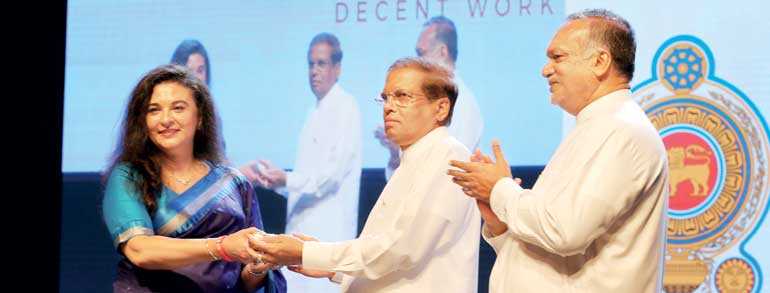Sunday Feb 22, 2026
Sunday Feb 22, 2026
Thursday, 18 April 2019 00:00 - - {{hitsCtrl.values.hits}}

24 hours. 24 cities. 24 events. The International Labour Organization (ILO), the United Nation’s oldest specialised agency, marked its century with a once-in-a-lifetime tribute to social justice and decent work circling the entire world.
Live-streamed internationally, the 24-hour global tour began in Suva, Fiji and passed through Colombo, New Delhi, Beirut, Cairo and other cities, showcasing the depth and diversity of ILO’s work in 24 hours.
In Sri Lanka, themes of future of work and the best of young Sri Lankan talent took centre stage as the ILO marked its 100th year with a colourful centenary event in Colombo.
The milestone event saw the symbolic deposit of the ratification instrument of the ILO’s Protocol of 2014 (P-29) to the Forced Labour Convention by the Government of Sri Lanka in the presence of a well-attended audience of diplomats; senior government officials; trade union leaders; employers’ representatives and private sector organisations; development partners; beneficiaries of ILO projects across Sri Lanka; past and present ILO staff; and the media. Sri Lanka is the first country in South Asia and only the second country in Asia to ratify this instrument.
The centenary celebrations were graced by President of Sri Lanka Maithripala Sirisena and Minister of Labour and Trade Union Relations Ravindra Samaraweera.
Sri Lanka was one of 24 countries from ILO’s 187 member states especially chosen to be a part of the 24-hour live global celebration. Viewers worldwide were given vignettes from Sri Lanka through Sri Lankan dance and fusion drumming and a shadow theatre performance that depicted Sri Lanka’s journey to a brighter future of work, conceptualised with ILO’s tripartite partners. Beneficiaries from ILO projects around the island attended the event, sharing personal anecdotes and inspirational stories of ILO’s impact in multiple districts.
A highlight of the event was Sri Lanka’s symbolic deposit of the ILO’s Forced Labour Protocol (P-29) which obliges states to criminalise and prosecute work that is done involuntarily and under coercion, and to take effective measures for its prevention. Countries which ratify P-29 are also required to provide victims with protection and access to remedies, including compensation.
“Congratulations to the ILO for celebrating 100 years. We are proud to join the centenary global celebrations. Sri Lanka has been a member of the ILO since 1948 and we are extremely proud to have a long-standing history of supporting the ILO’s leadership in propelling a global movement to eradicate forced labour, modern slavery, human trafficking and child labour,” commented Minister of Labour and Trade Union Relations Ravindra Samaraweera.
A special issue of the Sri Lanka Labour Gazette to mark the ILO’s 100th anniversary was launched at the event. The Labour Gazette is the Ministry of Labour’s quarterly publication on labour relations and labour statistics in Sri Lanka. A postal stamp and first day cover was also released at the event with the cooperation of the Ministry of Posts and Postal Services.
Commenting on ILO’s centenary, ILO Country Office for Sri Lanka and the Maldives Director Simrin Singh stated: “The ILO’s mandate is that universal, lasting peace can be established only if it is based on social justice. For the past 100 years, the ILO has worked to build an equitable and just world of work. We are grateful for the support that all our partners in Sri Lanka have extended to us. As we reflect on our journey of 100 years, we reaffirm our commitment to building a future of work in Sri Lanka which leaves no one behind.”
In March, the ILO celebrated with communities in the North, and will mark its centennial with activities around the island throughout 2019. To help Sri Lanka shape a future of work for the next century, the Country Office recently launched a report on the Future of Work in Sri Lanka examining the impact of emerging technologies on Sri Lanka’s changing world of work.
The ILO is the only international organisation which is tripartite, where workers and employers enjoy equal standing with governments in representation and decision making. Together they set labour standards, develop policies and devise programs upholding decent and productive work, in conditions of freedom, equity, security and dignity for all.